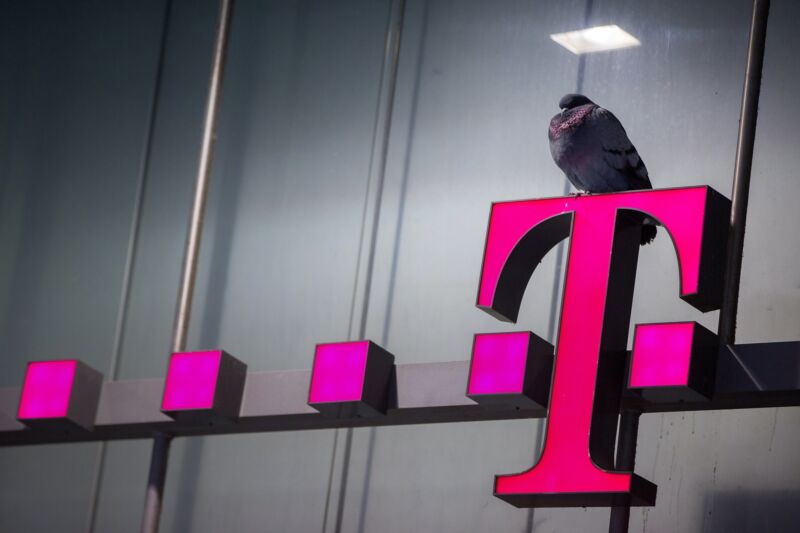Working the refs —
T-Mobile rivals say it has too much spectrum, urge FCC to impose limits.
Jon Brodkin
–

Enlarge / A pigeon rests on a T-Mobile logo outside a mobile phone store, operated by Deutsche Telekom AG, in Munich, Germany, on Monday, Feb. 6, 2017.
AT&T and Verizon are worried about T-Mobile’s vast spectrum holdings and have asked the Federal Communications Commission to impose limits on the carrier’s ability to obtain more spectrum licenses. Verizon kicked things off in August when it petitioned the FCC to reconsider its acceptance of a new lease that would give T-Mobile another 10MHz to 30MHz of spectrum in the 600MHz band in 204 counties. AT&T followed that up on Friday with a filing that supports many of the points made in Verizon’s petition.
T-Mobile was once the smallest of four national carriers and complained that it didn’t have enough low-band spectrum to match AT&T and Verizon’s superior coverage. But T-Mobile surged past Sprint in recent years and then bought the company, making T-Mobile one of three big nationwide carriers along with AT&T and Verizon. T-Mobile also bolstered its low-band spectrum holdings by dominating a 600MHz auction in 2017.
“The combination of Sprint and T-Mobile has resulted in an unprecedented concentration of spectrum in the hands of one carrier,” AT&T wrote in its filing to the FCC on Friday. “In fact, the combined company exceeds the Commission’s spectrum screen, often by a wide margin, in Cellular Market Areas representing 82 percent of the US population, including all major markets.”
T-Mobile’s large spectrum holdings demand “changes in how the Commission addresses additional acquisitions of spectrum by that carrier,” AT&T said in another part of the filing. AT&T also posted a blog on the topic, saying that “Additional spectrum leases with Dish will cause T-Mobile to exceed the 250MHz screen by as much as 136MHz.”
FCC must explain itself, AT&T says
The FCC’s spectrum screen is not a hard-and-fast limit but, rather, one data point the FCC uses in its public-interest analyses. T-Mobile’s new leases in the 600MHz band are with entities called Channel 51 License Company and LB License Co, which do not provide any service over the spectrum.
Even without the pending transactions, Verizon told the FCC that “T-Mobile already holds licenses for 311MHz of low- and mid-band spectrum nationwide. That is more than the low- and mid-band spectrum licensed to Verizon and AT&T combined.” Verizon said there is “a high likelihood” of competitive harms being caused by T-Mobile acquiring more spectrum, and it urged the FCC to “reject the arrangements or require T-Mobile to take action to mitigate those harms, including requiring spectrum divestitures.”
Officially, AT&T said it “takes no position on whether T-Mobile’s lease applications were properly accepted by the FCC,” but the company said that the FCC “should provide an explanation of why it permitted T-Mobile to further exceed the spectrum screen.”
“The Commission’s failure to issue a written order in a transaction allowing spectrum aggregation in excess of the screen to this degree is highly unusual… Moreover, without a written order explaining its analysis, there is no evidence that the Commission has carefully attempted to evaluate the potential for competitive harm,” AT&T wrote.
T-Mobile says Verizon is “disingenuous”
T-Mobile opposed Verizon’s position in an August filing. “Verizon does not even try to demonstrate any harm to itself from the 600MHz spectrum leases—a requirement for petitioners who did not participate in an earlier stage of the proceeding,” T-Mobile wrote. “As a company that elected not to participate in the Commission’s 600MHz auction and currently touts its massive millimeter-wave spectrum holdings as support for 5G superiority, it is simply disingenuous for Verizon to now complain that T-Mobile’s addition of 600MHz spectrum to its portfolio is somehow anticompetitive.”
T-Mobile also said its expanded spectrum holdings will boost competition for home-Internet service, “as T-Mobile plans to use the leased spectrum to offer sorely needed in-home wireless broadband in competition with Verizon—particularly in rural areas.”
Verizon had complained about T-Mobile’s large holdings of low- and mid-band spectrum in big cities including Los Angeles, Chicago, San Francisco, Baltimore, Philadelphia, Boston, Dallas, Houston, and Atlanta. T-Mobile countered that Verizon actually has more spectrum overall in each of those cities when counting the high-band (millimeter-wave) spectrum Verizon uses in its 5G network. But as we’ve covered in numerous articles, millimeter-wave signals don’t travel far and are easily blocked by walls and other obstacles, resulting in Verizon having a sparse 5G footprint. Recent tests by OpenSignal found that T-Mobile has significantly more 5G coverage than its rivals.

